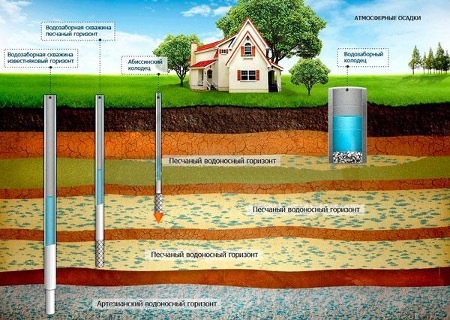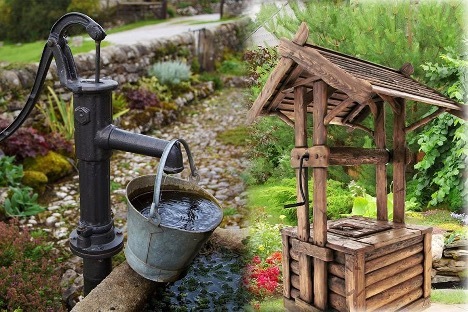Choosing between a well and a borehole to provide water supply to a home or cottage is an important decision that requires careful analysis of their pros and cons. Let's figure out what is better than a well or a borehole for a home and which option will be the most profitable and practical in various conditions.

The content of the article
- Comparison of features
- Pros and cons of a well
- Pros and cons of a well
- Recommendations for making a decision
Comparison of features
The choice between a well or a borehole depends on many factors, including the geological conditions of the site, the amount of water needed and the budget. Wells are generally easier and cheaper to install, but water quality can be inconsistent. Wells guarantee a more stable and cleaner source of water, especially in areas with deep groundwater. It is also important to take into account the difference between a well and a well: a well is drilled to a greater depth and has a smaller diameter, providing a more stable water supply.
Comparing the capabilities of a well and a well begins with an understanding of their design features and the method of water extraction. Wells are generally a traditional and time-tested method of accessing surface water. They are suitable for places where the groundwater level is relatively close to the ground surface. Wells, in turn, allow water to be extracted from deeper layers, which usually guarantees higher water quality and stability throughout the year.
Depending on the geological conditions of the area, the effectiveness of a well or borehole can vary significantly. In areas with high groundwater levels, a well will be a good and cost-effective solution. However, in areas with low groundwater levels or in places where the water is at great depth, a well is a more reliable source of water supply. In addition, in regions with a variable climate, where groundwater levels may fluctuate, a well provides a greater guarantee of continuous water supply.
Considering ease of use and maintenance, wells have their advantages and disadvantages. They are usually easier to maintain and repair, but require regular cleaning and can be susceptible to contamination due to their proximity to the ground. Wells, although more difficult to install and require professional maintenance, provide cleaner water and are less susceptible to external factors such as drought or pollution. In general, the choice between a well and a borehole should be based on a comprehensive analysis of all these factors, including individual needs, local conditions and financial capabilities.

Pros and cons of a well
When considering the issue of installing a water supply system for a home or cottage, it is important to understand the pros and cons of a well. This traditional water source has both advantages and disadvantages that should be considered before making a decision.
Pros of the well:
- Compared to a well, constructing a well is cheaper, which makes it an affordable option for many home and summer house owners.
- Wells are easier to maintain and clean, which is an important factor for those who prefer to take care of their household on their own.
- Well water does not require electricity, which can be important during outages or in remote areas.
Disadvantages of a well:
- Wells rely on surface water, and their effectiveness can decrease during periods of drought or when groundwater levels drop.
- Because wells are closer to the surface, they are more susceptible to contamination from the environment, which can affect water quality.
- Wells can have a limited amount of water, which can be a problem for large families or heavy use.
Understanding these aspects will help you make an informed choice between a well and a borehole, taking into account the specific conditions and needs of your home or cottage.
Pros and cons of a well
When arranging a water supply system for a home or cottage, a well is one of the popular options. Let's look at the advantages and disadvantages of a basic well alternative to better understand its suitability for your property.
Well advantages:
- Due to their deep water extraction, wells often provide cleaner, higher quality water than wells.
- Wells are less dependent on seasonal fluctuations in groundwater levels, providing a more stable water supply throughout the year.
- The depth of the well reduces the risk of contamination from surface layers of soil and surface water.
Disadvantages of a well:
- Drilling a well and its construction is more expensive than constructing a well.
- A well requires electricity to function, which can be a problem during blackouts or in remote locations without access to the power grid.
- Repairing and maintaining a well usually requires the involvement of specialists, which can be costly and complex.
By weighing these pros and cons, you can more consciously approach the choice between a well and a well, based on your needs, capabilities and specifics of the site.
Recommendations for making a decision
Depending on individual needs and site conditions, the choice between a well and a borehole may vary. For small summer cottages where water consumption is low and there are no strict requirements for its quality, a well may be suitable. However, for permanent residence in a private house, especially if there is a need for a large amount of clean water, a well will be a more preferable option.
Choosing between a well and a well is a decision that should be based on careful consideration of all factors, including your budget, water needs and the geological conditions of the site. Either way, it's an investment that will provide you with a vital resource - water.


